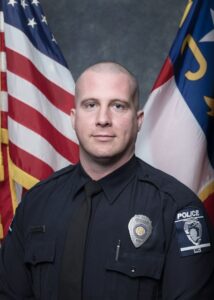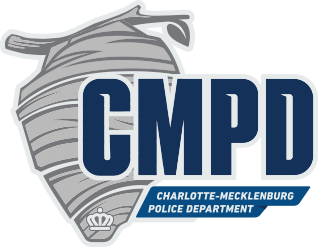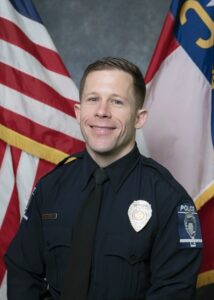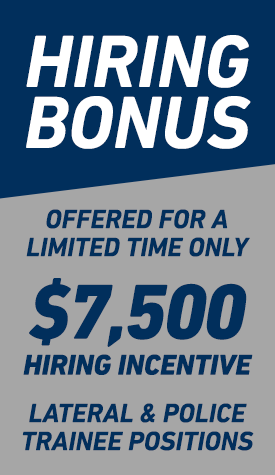From the first day you set foot in the Charlotte-Mecklenburg Police Training Academy, you’ll be surrounded by a team of training officers invested in your success.
Some, like Lead Instructor / Officer Michael Gainey, are faces you’ll see every day. Others you’ll encounter in specialized training such as firearms and driving instruction.
Regardless of how often you interact with each training officer, they – along with your recruiters – are here to challenge and support you on your journey to the badge.
Meet some of the CMPD Academy training team:
LEADERSHIP
 Lead Instructor & Officer Michael Gainey
Lead Instructor & Officer Michael Gainey
With CMPD Since: 2021
How often do recruits work with you?
I am with recruits all day, and always there for them after graduation when needed.
Why do you train new recruits?
I want to help guide new officers in the right direction as they will potentially make life-and-death decisions on patrol. I want to provide inspiration and support when needed and offer my personal experiences with similar obstacles or struggles they may be going through.
Where do you see recruits fall behind?
Academics and physical strength. Have a good study plan after hours, and work out at home, too – especially on weekends.
 Training Officer Gregory Dunston
Training Officer Gregory Dunston
With CMPD Since: 2009
What role(s) did you serve before becoming a trainer in the Academy?
I started in the Westover Division first on patrol, then as a narcotics investigator. After that, I went to Vice and Narcotics as a detective for a few years. Next, I became a task force officer with the FBI investigating human trafficking cases.
How often do recruits work with you?
I work with the recruits daily. I am second in command to Officer Gainey for Recruit Class 196.
How can recruits prepare to succeed in the Academy?
Recruits need to be in decent shape when they arrive at the Academy. They have to be respectful and professional throughout the Academy. Finally, they have to be ready to learn and dedicate time to their studies.
ACADEMICS & ADMINISTRATIVE
 BLET Administrator Nisee Mauldin
BLET Administrator Nisee Mauldin
With CMPD Since: 1998
What is your role at the Academy?
I oversee all the state paperwork for the recruits and the state instructors for the department. I am also a state instructor and assist with teaching at the Academy.
What role(s) did you serve in the department before the Academy?
I was in communications for the first 24 years. I was a telecommunicator, trainer and then the training coordinator for the last 13 years.
How much time will recruits work with you?
I interact with the recruits multiple times a week, sometimes daily.
Curriculum Developer Lauren Orosz
With CMPD Since: 2009
What role(s) did you serve before becoming a trainer in the Academy?
I came from the Communications Division. I spent five years as a quality assurance analyst and eight years as a telecommunicator.
 Learning Management System Admin & Photographer Kim Kilic
Learning Management System Admin & Photographer Kim Kilic
With CMPD Since: 2004
How often do recruits work with you?
I am in and out of classes frequently.
My primary role with CMPD is with MySuccess Learning, the department’s learning management system. However, I also am admin / technical / logistical support for the recruit and in-service training staff. I interact frequently with recruits and our leadership classes.
DRIVING INSTRUCTION
Lead Driving Instructor, Physical Fitness Instructor & Officer Chrissy Pickert
With CMPD Since: 2013
How often do recruits work with you?
I work with recruits for over 80 hours of driving and every day for physical fitness.
How can recruits prepare to succeed in your area of the Academy?
Everyone has developed driving habits through their years of driving. Some are good habits and some not so good. Start practicing good driving habits now. Drive with two hands, use your turn signals and, most importantly, start backing up! We see a lot of recruits struggle with the backing courses. Start backing in when you are parking in your driveway, grocery store, really anywhere you go…just back in!
In regards to physical fitness, start training before the first day of the Academy. You don’t need a lot of equipment or a home gym to train. You can start to prepare with running and bodyweight movements.
FIREARMS INSTRUCTION
 Rangemaster, Firearms Training Unit Supervisor & Sergeant Steve Winterhalter
Rangemaster, Firearms Training Unit Supervisor & Sergeant Steve Winterhalter
With CMPD Since: 1998
Why do you train new recruits?
It allows me to give back to new recruits what I have learned through my training and experience. I have served in various roles and want to share my knowledge with recruits to make them safer and improve CMPD as a whole.
How can recruits prepare to succeed in your area of the Academy?
Recruits should come to the Academy in top physical condition and be prepared and willing to learn how we train at CMPD. They will be expected to learn a lot of material in a short period of time and should spend time outside the Academy working on what range staff provides.
Where do you see recruits fall behind or fail?
There will be many drills that recruits can work on at home, including the draw, dry fire drills and injured performance. We can often quickly determine those recruits who practice and those who do not by their performance on the range.
Recruits are encouraged to become proficient in many areas, some of which do not include live fire drills, but simply repetitions and practice.
 Firearms Instructor & Officer Michael C. Wallin
Firearms Instructor & Officer Michael C. Wallin
With CMPD Since: 2003
Why did you take your role training new recruits?
I wanted to be a positive role model and pass on years of experience specializing in firearms training and tactics.
How can recruits prepare to succeed with firearms?
Keep an open mind, bring a positive attitude and complete lots of dry repetitions based on drills received during the blue gun issue. (A blue gun is a gun replica used in training.)
Where do you see recruits fall behind or fail in your area of the Academy?
When they don’t put in the work.
 Firearms Instructor & Officer Brian Walsh
Firearms Instructor & Officer Brian Walsh
With CMPD Since: 2002
How often do recruits work with you?
Recruits work 96 hours with us.
What role(s) did you serve before becoming a trainer in the Academy?
I worked patrol and Street Crimes Task Force, and I have been on SWAT since 2006.
 Range Staff & Officer Grant Holmes
Range Staff & Officer Grant Holmes
With CMPD Since: 2008
How can recruits prepare to succeed on the range?
Listen and practice at home.
Where do you see recruits fall behind or fail?
When they do not invest the time.
PHYSICAL TRAINING (PT), SUBJECT CONTROL / ARREST TECHNIQUES (SCAT) & MORE
 Training Officer Esquire Bethea
Training Officer Esquire Bethea
With CMPD Since: 2015
How often do recruits work with you?
Recruits see me daily during their six-month Academy journey.
Where do you see recruits fall behind or fail?
I’ve seen recruits fall behind in testing, which then leads to falling behind in physical training and so on. It becomes a domino effect. As you begin to worry about one thing, it quickly leads to three more.
Is there a story of a particular recruit that stands out for you?
A recruit was recycled (moved back to an earlier part of training). He came back to the Academy years later with great determination and drive. It showed every day.
Now this recruit is an officer assigned to the Academy as a recruit trainer. That recruit was me.
Training Officer Jake Carroll
With CMPD Since: 2015
How often do recruits work with you?
Daily.
Why do you train new recruits?
I enjoy witnessing the growth these men and women will experience as part of the Academy, and gain satisfaction in knowing that I played a part in preparing these recruits to be police officers for the City of Charlotte.
How can recruits prepare to succeed in your area of the Academy?
Come to the Academy with a humble attitude and a willingness to learn.
Training Officer Billy Etter
With CMPD Since: 2004
Why do you train new recruits?
I have always enjoyed instructing, and new recruits are the most eager to learn.
How often do recruits work with you?
Recruits see me for several weeks in the various classes where I instruct and assist.
How can recruits prepare to succeed in your area of the Academy?
Pay attention, work hard and have heart.
 Lateral & New Recruit Training Officer Michael “Grant” Holland
Lateral & New Recruit Training Officer Michael “Grant” Holland
With CMPD Since: 2009
How often do recruits work with you?
I spend a good bit of time with recruits, particularly during Subject Control / Arrest Techniques (SCAT) and physical training.
Why do you train new recruits?
I want to assist in building the next generation of officers to the best of my ability and do it within a team environment.
How can recruits prepare to succeed in your area of the Academy?
Cultivate mental toughness and have a humble attitude.
Training Officer Andrea Mullins
With CMPD Since: 2016
How often do recruits work with you?
Several times a week.
Why do you train new recruits?
I felt very unprepared when I began my career and want to help newer officers be better able to respond to the challenges that they will face.
Is there a story of a particular recruit that stands out for you?
Several recruits have started their Academy journey badly and ended the Academy as success stories. I recall one recruit who was on the brink of failing out within the first month. He was able to figure out a way to get his studies on the right track and completed the Academy. It took a lot of hard work and effort on his part. Nothing comes easy.
ACCELERATE YOUR CAREER HERE
Ready to join the men and women of CMPD? Start your new trainee, lateral entry or intermediate entry application today.





























